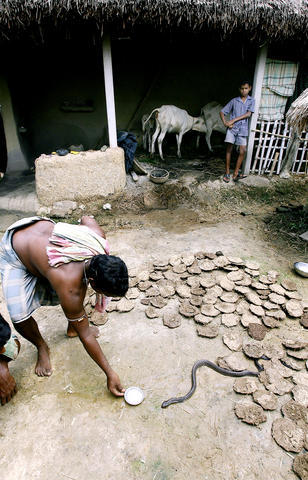For some people, a poisonous snake hissing in their courtyard is the stuff of nightmares. But in this sleepy village in eastern India, the reptiles are welcome and abundant.
The village of Choto Pashla in West Bengal state has one snake for every two residents, mainly the poisonous monocled cobra, a black reptile with a yellow ring around its neck that can grow to 2m in length.
Such snakes are found everywhere -- in rice fields, ditches, muddy ponds and even sometimes sunning themselves by houses -- and no one appears to fear them.

PHOTO: AFP
"The poison-fanged reptiles represent a way of life in Choto Pashla. People of the neighboring villages are scared to come here," said Samir Chatterjee, the local school headmaster, who has written a book about the snakes.
"A recent count by the villagers found there are more than 3,000 snakes in this village of 6,000 people," Chatterjee said.
The Geological Survey of India is studying the village to figure out why the cobras are flourishing there, an official said.
"We wonder why a particular species of snakes is thriving in this village," said the official, asking not to be named. "We are looking into the topography of the village."
Local lore has it that the reptiles first came to the little rice-farming village 130km northwest of the state capital Kolkata en masse six centuries ago during a flood.
The Hindu village began worshipping the snakes as representatives of a goddess and believe that their farms have consequently prospered ever since.
"Women offer milk to the reptiles at midday when the priest worships the goddess of snakes, Manasa, in the temple," Chatterjee said.
When a snake dies, the villagers place it in an earthen jar and then immerse it in the sacred Ganges River.
Still, apart from feeding them and performing their last rites, the villagers do try to keep the snakes at arm's length, or more.
"Our customs forbid us from touching the snakes," said 25-year-old Dipu Majhi who was bitten by a snake nearly five years ago while fishing in a pond.
Nearly a dozen villagers die of snake bites every year, locals say, with the village still relying on traditional treatments.
"I was asked to bathe in the pond beside the temple of the goddess of snakes and then a pinch of mud from the temple compound was rubbed on the injury," said Majhi, a fish and vegetable seller.
"My hand swelled but healed after a week," Majhi said.
Anti-venom drugs are available at some hospitals in the state, but these may not be near enough for the villagers to get to in time.
"It's a unique village where poisonous cobras are co-existing with human beings," said Dipak Mitra, a herpetologist. Mitra also runs a snake park in Kolkata with 700 species of the reptiles, and has visited the village.
"It's simply incredible," he said.

James Watson — the Nobel laureate co-credited with the pivotal discovery of DNA’s double-helix structure, but whose career was later tainted by his repeated racist remarks — has died, his former lab said on Friday. He was 97. The eminent biologist died on Thursday in hospice care on Long Island in New York, announced the Cold Spring Harbor Laboratory, where he was based for much of his career. Watson became among the 20th century’s most storied scientists for his 1953 breakthrough discovery of the double helix with researcher partner Francis Crick. Along with Crick and Maurice Wilkins, he shared the

OUTRAGE: The former strongman was accused of corruption and responsibility for the killings of hundreds of thousands of political opponents during his time in office Indonesia yesterday awarded the title of national hero to late president Suharto, provoking outrage from rights groups who said the move was an attempt to whitewash decades of human rights abuses and corruption that took place during his 32 years in power. Suharto was a US ally during the Cold War who presided over decades of authoritarian rule, during which up to 1 million political opponents were killed, until he was toppled by protests in 1998. He was one of 10 people recognized by Indonesian President Prabowo Subianto in a televised ceremony held at the presidential palace in Jakarta to mark National

US President Donald Trump handed Hungarian Prime Minister Viktor Orban a one-year exemption from sanctions for buying Russian oil and gas after the close right-wing allies held a chummy White House meeting on Friday. Trump slapped sanctions on Moscow’s two largest oil companies last month after losing patience with Russian President Vladimir Putin over his refusal to end the nearly four-year-old invasion of Ukraine. However, while Trump has pushed other European countries to stop buying oil that he says funds Moscow’s war machine, Orban used his first trip to the White House since Trump’s return to power to push for

LANDMARK: After first meeting Trump in Riyadh in May, al-Sharaa’s visit to the White House today would be the first by a Syrian leader since the country’s independence Syrian President Ahmed al-Sharaa arrived in the US on Saturday for a landmark official visit, his country’s state news agency SANA reported, a day after Washington removed him from a terrorism blacklist. Sharaa, whose rebel forces ousted long-time former Syrian president Bashar al-Assad late last year, is due to meet US President Donald Trump at the White House today. It is the first such visit by a Syrian president since the country’s independence in 1946, according to analysts. The interim leader met Trump for the first time in Riyadh during the US president’s regional tour in May. US envoy to Syria Tom Barrack earlier